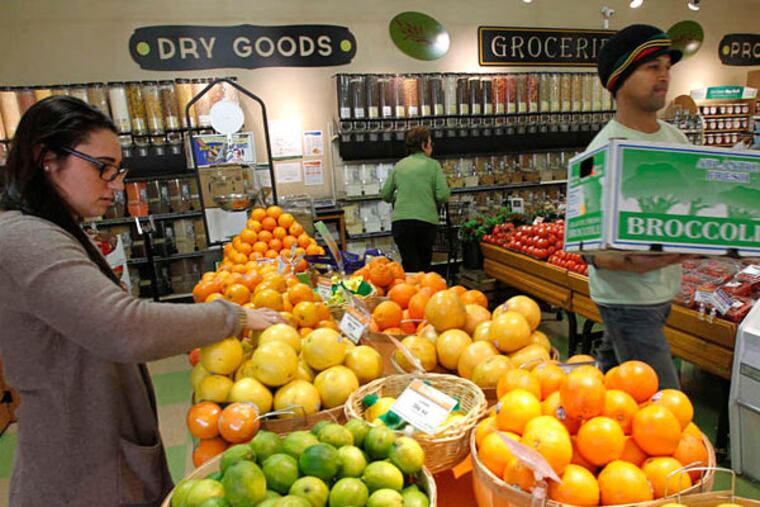Creekside, new Elkins Park co-op, 'off to a great start'
For years, Elkins Park neighbors sadly viewed the building that was Ashbourne Market, a store and local hub across from the train station that closed in 2002. Snubbed by developers, it had for a time become an odd, little-used farmer's market.

For years, Elkins Park neighbors sadly viewed the building that was Ashbourne Market, a store and local hub across from the train station that closed in 2002. Snubbed by developers, it had for a time become an odd, little-used farmer's market.
"It was a ghost town," said Max Minkoff, a local entrepreneur. "Tumbleweeds."
If a grocery would not take the location, perhaps a food co-op would work, the neighbors decided at a meeting five years ago at the local library. Co-ops operate by and for their members, and try simply to break even.
The neighbors approached Weaver's Way in West Mount Airy. But Weaver's Way, one of the region's older co-ops, was planning a second location in Chestnut Hill. Sorry, the Elkins Park group was told, we can offer guidance but cannot afford to fund another start-up.
Undaunted, the neighbors moved ahead. They commissioned a study to verify that the building on High School Road indeed would be the best location for Creekside Co-op. They set out to secure loans and build a membership list. They hoped for 1,200 households to each pony up $400 lifetime for an equity share in the co-op.
Last week - about two months after opening - Creekside held its grand opening beneath the green awnings. "We're off to a great start," said Minkoff, the board president.
In terms of membership, Creekside certainly is succeeding; at last count, Minkoff said, the co-op had 1,871 households and hoped to do $5.8 million in sales in its first year. The store employs 56 people, half of them part time, and is managed by Andrew Schloss, a chef and food consultant. Vantage Point Bank put up $3 million for a loan guaranteed by the U.S. Department of Agriculture.
The times appear to be healthy for food co-ops. Though not always the least expensive way to shop - these small businesses are undersold regularly by supermarkets and big-box stores - they offer a sense of community for their members and tend to keep their product lines healthful and local.
"A whole lot of people want to know where their food is coming from," said Sue Wasserkrug, who is on the board of both Weaver's Way and the new Mid-Atlantic Food Co-op Alliance, a group of 30 food co-ops from New York to Virginia. Besides the new Creekside, the Chestnut Hill location of Weaver's Way, and Mariposa's new location in West Philadelphia, there have been movements to create co-ops in Doylestown, Ambler, South Philadelphia, Kensington, and Francisville. The region's co-op granddaddy, Swarthmore, has been around for 75 years and is regarded as the third-oldest in the country.
"I think we should invest in our community," said Melissa Twersky of Elkins Park, shopping at Creekside last week. "I like the idea of buying local." That said, she is price-conscious as she fills her market basket, buying quality perishables and some grocery items at Creekside while going to other stores for paper products and items that are more heavily discounted elsewhere.
Lemons last week were 49 cents each at Creekside, slightly more than at other markets. Organic red bell peppers ($5.99) were dramatically more expensive. But the $2.49 cantaloupe - or two for $3 for members - was average.
"Members want to shop here," Schloss said. "But if our milk is $7 a gallon, even though they want to shop here, they can't. So we have to have prices that allow them to come in. We don't have a board or stockholders telling us how much to make. Our goal is to serve the community."
Nonmembers may shop at Creekside, though they do not benefit from certain specials.
Creekside, like some other co-ops, mixes the healthful, organic, local foods with the stuff that people may actually crave. There are five kinds of agave nectar, but other sweeteners are also on the shelves. Next to powdered goat milk are cans of Carnation evaporated milk. Amy's organic soups are on the shelf just below Progresso canned soups.
There's a deli and prepared-foods counter with rich indulgences.
"There's nothing that says a co-op has to be all-natural," Schloss said. "Co-ops are what members want because they're owned by members." Still, Schloss said, the co-op keeps an eye on its supplies: "Our members . . . don't want things that are sourced from mysterious sources in China."